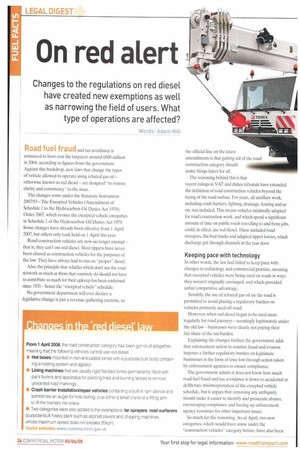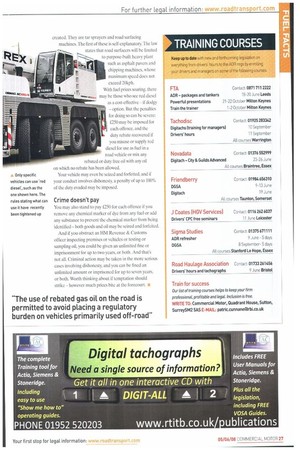On red alert
Page 26

Page 27

If you've noticed an error in this article please click here to report it so we can fix it.
Changes to the regulations on red diesel have created new exemptions as well as narrowing the field of users. What type of operations are affected?
Words: Adam Hill Road fuel fraud and tax avoidance is estimated to have cost the taxpayer around £600 million in 2004, according to figures from the government. Against this backdrop, new laws that change the types of vehicle allowed to operate using rebated gas oil otherwise known as red diesel are designed -to restore clarity and consistency" to the issue.
The changes come under the Statutory Instrument 2007/93 The Excepted Vehicles (Amendment of Schedule 1 to the Hydrocarbon Oil Duties Act 1979) Order 2007, which revises the excepted vehicle categories in Schedule 1 of the Hydrocarbon Oil Duties Act 1979. Some changes have already been effective from 1 April 2007, but others only took hold on 1 April this year.
Road construction vehicles are now no longer exempt that is, they can't use red diesel. Most tippers have never been classed as construction vehicles for the purposes of the law. They have always had to run on "proper" diesel.
Also, the principle that vehicles which don't use the road network as much as those that routinely do should not have to contribute as much for their upkeep has been enshrined since 1935hence the "excepted vehicleschedule.
No government department will ever declare a legislative change is just a revenue-gathering exercise, so the official line on the latest amendments is that getting rid of the road construction category should make things fairer for all.
The reasoning behind this is that recent rulings in VAT and duties tribunals have extended the definition of road construction vehicles beyond the laying of the road surface. For years, all ancillary work, including crash barriers, lighting, drainage, fencing and so on, was included. This means vehicles minimally adapted for road construction work, and which spend a significant amount of time on public roads travelling to and from jobs, could, in effect, use red diesel. These included road sweepers, flat-bed trucks and adapted tipper lorries, which discharge grit through channels in the rear door.
Keeping pace with technology
In other NA' ords, the law had failed to keep pace with changes in technology and commercial practice, meaning that excepted vehicles were being used on roads in ways they weren't originally envisaged, and which provided unfair competitive advantage.
Sensibly, the use of rebated gas oil on the road is permitted to avoid placing a regulatory burden on vehicles primarily used off-road.
However, when red diesel began to be used more regularly for road journeys seemingly legitimately under the old law businesses were clearly not paying their fair share of the tax burden.
Explaining the changes further, the government adds that enforcement action to counter fraud and evasion imposes a further regulatory burden on legitimate businesses in the form of time lost through action taken by enforcement agencies to ensure compliance.
The government admits it does not know how much road fuel fraud and tax avoidance is down to accidental or deliberate misinterpretation of the excepted vehicle schedule, but it argues that removing any ambiguity should make it easier to identify and prosecute abuses, encouraging compliance and freeing up enforcement agency resources for other important issues.
So much for the reasoning. As of April, two new categories, which would have come under the -construction vehicles" category before, have also been created. They are tar sprayers and road surfacing machines. The first of these is self-explanatory. The law p.......states that road surfacers will be limited to purpose-built heavy plant such as asphalt pavers and chipping machines, whose maximum speed does not exceed 20kph.
With fuel prices soaring, there may be those who see red diesel as a cost-effective -if dodgy option. But the penalties for doing so can he severe: £250 may be imposed for each offence, and the duty rebate recovered if you misuse or supply red diesel for use as fuel in a road vehicle or mix any ebated or duty free oil with any oil on which no rebate has been allowed.
Your vehicle may even be seized and forfeited, and if your conduct involves dishonesty. a penalty of up to 100% of the duty evaded may be imposed.
Crime doesn't pay
You may also stand to pay £250 for each offence if you remove any chemical marker of dye from any fuel or add any substance to prevent the chemical marker from being identified both goods and oil may be seized and forfeited.
And if you obstruct an HM Revenue & Customs officer inspecting premises or vehicles or testing or sampling oil, you could be given an unlimited fine or imprisonment for up to two years, or both. And that's not all. Criminal action may be taken in the more serious cases involving dishonesty, and you can be fined an unlimited amount or imprisoned for up to seven years, or both. Worth thinking about if temptation should strike however much prices bite at the forecourt. F4








































































































































































